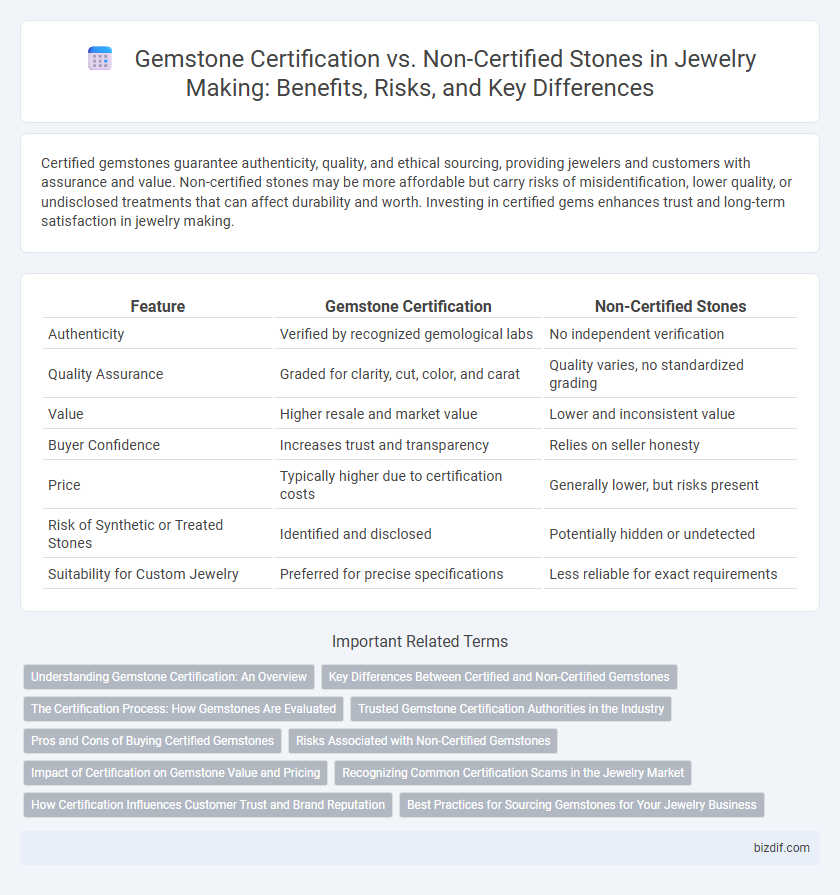Certified gemstones guarantee authenticity, quality, and ethical sourcing, providing jewelers and customers with assurance and value. Non-certified stones may be more affordable but carry risks of misidentification, lower quality, or undisclosed treatments that can affect durability and worth. Investing in certified gems enhances trust and long-term satisfaction in jewelry making.
Table of Comparison
| Feature | Gemstone Certification | Non-Certified Stones |
|---|---|---|
| Authenticity | Verified by recognized gemological labs | No independent verification |
| Quality Assurance | Graded for clarity, cut, color, and carat | Quality varies, no standardized grading |
| Value | Higher resale and market value | Lower and inconsistent value |
| Buyer Confidence | Increases trust and transparency | Relies on seller honesty |
| Price | Typically higher due to certification costs | Generally lower, but risks present |
| Risk of Synthetic or Treated Stones | Identified and disclosed | Potentially hidden or undetected |
| Suitability for Custom Jewelry | Preferred for precise specifications | Less reliable for exact requirements |
Understanding Gemstone Certification: An Overview
Gemstone certification provides an authoritative evaluation of a stone's authenticity, quality, and characteristics, issued by recognized gemological laboratories such as GIA, AGS, or IGI. Certified gemstones include detailed information on cut, color, clarity, carat weight, and any treatments or enhancements, ensuring transparency and buyer confidence. Non-certified stones lack this formal validation, increasing the risk of misrepresentation and potential undervaluation in the jewelry market.
Key Differences Between Certified and Non-Certified Gemstones
Certified gemstones come with a detailed report from reputable gemological laboratories such as GIA or IGI, verifying authenticity, quality, and characteristics like cut, clarity, carat, and origin. Non-certified stones lack official documentation, increasing the risk of purchasing synthetic, treated, or misrepresented gems. The certification process enhances value, provides consumer confidence, and aids resale, unlike uncertified gemstones which may pose authenticity challenges.
The Certification Process: How Gemstones Are Evaluated
The certification process for gemstones involves rigorous evaluation of their authenticity, quality, and characteristics by accredited gemological laboratories using standardized methods such as spectroscopy, refractometry, and magnification. Certified gemstones receive detailed reports documenting their carat weight, clarity, color, cut, and any treatments or enhancements, ensuring transparency and trust in the jewelry market. Non-certified stones lack this verified data, increasing the risk of inaccurate representation, synthetic inclusions, or undisclosed treatments in jewelry making.
Trusted Gemstone Certification Authorities in the Industry
Trusted gemstone certification authorities such as the Gemological Institute of America (GIA), International Gemological Institute (IGI), and American Gem Society (AGS) provide detailed reports verifying the authenticity, quality, and characteristics of gemstones, ensuring transparency and consumer confidence. Certified stones come with documented grading on cut, color, clarity, and carat weight, distinguishing them from non-certified stones that lack verifiable quality assurance and may carry higher risks of misrepresentation. Selecting gemstones with certification from reputable labs enhances value, supports ethical sourcing, and protects jewelry makers and buyers from counterfeit or treated stones.
Pros and Cons of Buying Certified Gemstones
Certified gemstones guarantee authenticity, quality, and ethical sourcing, providing buyers with verified information on carat weight, color, clarity, and cut. Non-certified stones often come at lower prices but carry risks of misrepresentation, synthetic enhancements, or treatments that may affect value and durability. Investing in certified stones enhances buyer confidence, resale value, and long-term satisfaction, while uncertified stones may require additional expert appraisal to mitigate potential risks.
Risks Associated with Non-Certified Gemstones
Non-certified gemstones carry significant risks including misidentification, undisclosed treatments, and synthetic or imitation stones being passed off as natural. Lack of certification compromises transparency, making it difficult to verify quality, authenticity, and value, which can lead to financial loss and reduced resale potential. Certified gemstones, evaluated by reputable gemological laboratories, provide reliable documentation ensuring the stone's origin, characteristics, and durability.
Impact of Certification on Gemstone Value and Pricing
Gemstone certification significantly influences value and pricing by providing verified authenticity, origin, and quality parameters, which assures buyers of the stone's legitimacy and enhances market trust. Certified gemstones typically command higher prices due to documented transparency on factors like carat weight, clarity, cut, and treatments, differentiating them from non-certified stones that carry higher risk of undisclosed flaws or synthetic origins. The presence of a respected gemological certificate from institutions such as GIA or AGS directly elevates resale value, liquidity, and buyer confidence in the gemstone.
Recognizing Common Certification Scams in the Jewelry Market
Gemstone certification provides verification of a stone's authenticity and quality, utilizing recognized laboratories like GIA and AGS, which helps buyers avoid counterfeit or altered gems. Non-certified stones often lack documented origin and treatment history, increasing the risk of misrepresentation and inferior quality. Common certification scams include fake certificates, forged grading reports, and misuse of reputable lab names, making it essential to verify credentials through official databases and professional appraisals in the jewelry market.
How Certification Influences Customer Trust and Brand Reputation
Gemstone certification significantly enhances customer trust by providing verified information about the stone's authenticity, quality, and origin, thereby reducing the risk of fraud. Certified gemstones boost brand reputation by demonstrating a commitment to transparency and quality assurance, which attracts discerning buyers and elevates market credibility. Non-certified stones may undermine consumer confidence due to uncertainties regarding their value and authenticity, potentially damaging a jeweler's brand image.
Best Practices for Sourcing Gemstones for Your Jewelry Business
Sourcing certified gemstones enhances credibility by ensuring authenticity, quality, and ethical origins, which builds trust with customers and reduces risks associated with synthetic or treated stones. Best practices include obtaining certificates from reputable gemological laboratories such as GIA or AGS, verifying the stone's origin, and maintaining transparent records for inventory and sales. Non-certified stones may offer cost advantages but pose risks like misidentification and reduced resale value, underscoring the importance of prioritizing certification to protect brand reputation and customer satisfaction.
Gemstone certification vs Non-certified stones Infographic

 bizdif.com
bizdif.com